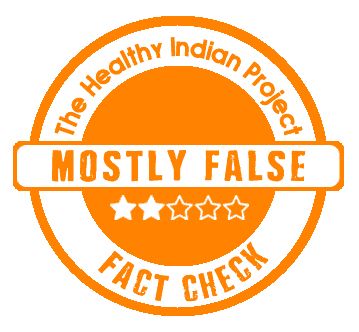
Is there a link between dairy consumption and asthma?
While dairy consumption doesn’t directly cause asthma, it may exacerbate symptoms in individuals with dairy allergies. Dairy allergy reactions can mimic asthma symptoms, such as wheezing and difficulty breathing. However, not all asthma cases are related to dairy, and eliminating dairy from the diet should be done under medical guidance to avoid nutritional deficiencies.
Last Updated on March 22, 2024 by Neelam Singh
Quick Take
A YouTube video featuring a discussion on the connection between dairy causes asthma was fact-checked, and we found the claim to be Mostly False.

The Claim
Yah’ki Awakened, in a youtube video titled “CANCER & AUTISM CONNECTION TO CELL PHONE USE,” claimed that severe dairy use causes asthma.
For ages, dairy has been blamed for making asthma worse by causing more mucus, but studies don’t back this up. People still think asthma patients should avoid dairy, but that might not be true. Dairy is crucial for calcium, especially for groups like postmenopausal women and growing kids who might need corticosteroids. Skipping dairy could lead to nutrient problems like osteoporosis. Even kids avoiding dairy for allergies risk lacking calcium. So, avoiding dairy might not help asthma and could harm overall health.
Fact Check
What is asthma?
Asthma is a chronic respiratory condition characterised by inflammation and narrowing of the airways, leading to recurrent episodes of wheezing, coughing, chest tightness, and shortness of breath. Triggers such as allergens, pollution, exercise, or respiratory infections can exacerbate symptoms. The exact cause of asthma is not fully understood, but it likely involves a combination of genetic and environmental factors. Management typically includes avoiding triggers, using inhalers to relieve symptoms and prevent flare-ups, and sometimes medication to control inflammation. Asthma varies in severity and can significantly impact daily activities and quality of life if not properly managed.
Does dairy cause asthma?
The link between dairy consumption and asthma is complex and varies among individuals. While some studies suggest that dairy products may exacerbate asthma symptoms due to potential inflammatory effects or allergic reactions to dairy proteins, not everyone with asthma experiences worsening symptoms from consuming dairy. A 2023 study found that overall, dairy intake wasn’t clearly linked to lower asthma risk in kids. But interestingly, in some studies and in kids who weren’t Asian, they did see a connection. These kids who consumed more dairy seemed to have a lower risk of getting asthma. However, more research is needed to understand how milk and dairy affect asthma in children.
Another 2024 study conducted in central Iran looked at whether dairy intake affects asthma symptoms in kids. They surveyed children aged 6-8 and 13-14 about their diet and asthma symptoms. Surprisingly, they found that drinking milk didn’t seem to make asthma symptoms worse. In fact, eating things like cheese and yogurt might even lower the chances of wheezing in kids. Overall, they found no link between dairy intake and asthma symptoms, suggesting that dairy might not be as bad for asthma as some people think.
What is dairy allergy?
A dairy allergy is when the immune system reacts to proteins in cow’s milk and dairy products. Symptoms can include skin rash, stomach cramps, breathing difficulties, and in severe cases, anaphylaxis. Diagnosis involves medical history and allergy testing. Treatment includes avoiding dairy products and carrying an epinephrine auto-injector for emergencies.
Does dairy allergy cause asthma?
In some cases, food/dairy allergy can contribute to asthma symptoms. When someone with a dairy allergy consumes dairy products, their immune system may react to the proteins in the dairy, triggering asthma symptoms such as wheezing, coughing, and difficulty breathing. This reaction is known as allergic asthma.
However, it’s important to note that not everyone with a dairy allergy will necessarily experience asthma symptoms. Allergic reactions can vary widely among individuals, and asthma triggers can differ from person to person.
If you suspect that dairy allergy is contributing to your asthma symptoms, it’s essential to consult with a healthcare professional for proper diagnosis and management. They can help you identify triggers and develop a plan to manage your asthma effectively, which may include dietary modifications to avoid dairy products if necessary.

Chaitali Bharatiya, M.Sc. Specialized Dietetics in Diabetes and Cardiac Nutrition said, “In recent years, many people have adopted dairy-free diets, believing that dairy products can worsen asthma symptoms or even cause asthma. While some studies suggest that dairy may increase mucus production and trigger breathing difficulties in asthma sufferers, not everyone with asthma reacts negatively to dairy. Scientific evidence on the dairy-asthma connection is mixed, with some studies finding a potential link while others find none.” It’s crucial to consider individual differences and seek guidance from healthcare professionals before making dietary changes based on this claim. Always fact-check and gather accurate information before drawing conclusions.
Disclaimer: Medical Science is an ever evolving field. We strive to keep this page updated. In case you notice any discrepancy in the content, please inform us at [email protected]. You can futher read our Correction Policy here. Never disregard professional medical advice or delay seeking medical treatment because of something you have read on or accessed through this website or it’s social media channels. Read our Full Disclaimer Here for further information.




